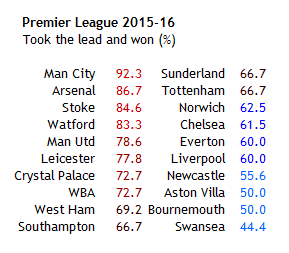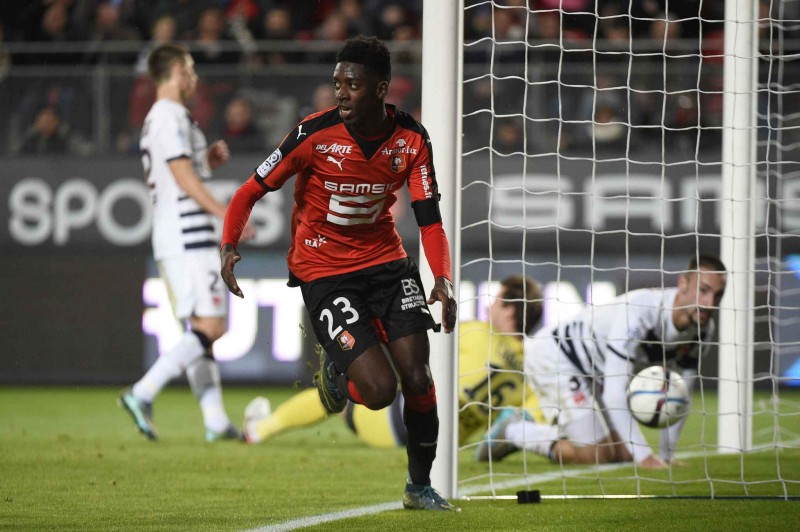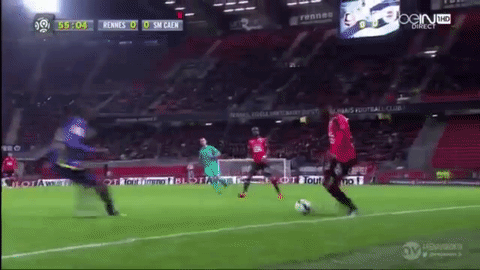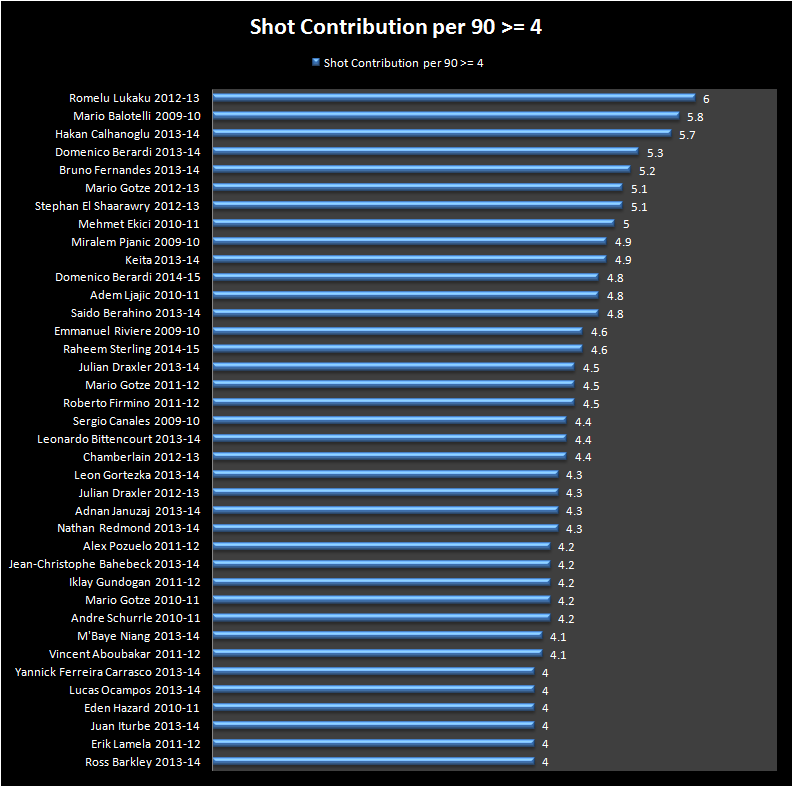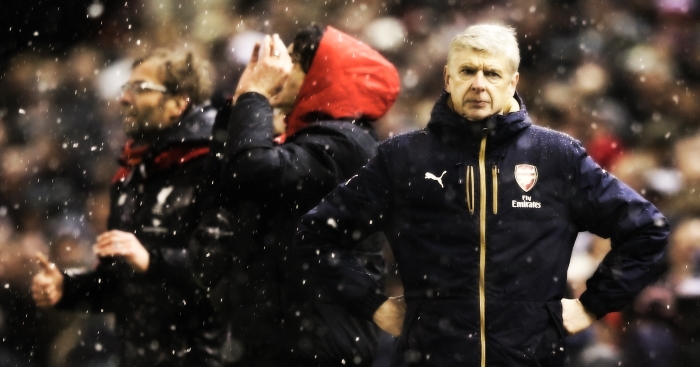 In football scoring first helps. A lot. This season in the Premier League around 70% of teams that have scored the first goal have won the game, and research suggests that unsurprisingly, the home and away splits for this move as you might expect. When we consider that the average game has only around 2.6 goals in it, scoring at all is a big deal. Just for interest, here's a look at this season to see which team have performed well by this measure:
In football scoring first helps. A lot. This season in the Premier League around 70% of teams that have scored the first goal have won the game, and research suggests that unsurprisingly, the home and away splits for this move as you might expect. When we consider that the average game has only around 2.6 goals in it, scoring at all is a big deal. Just for interest, here's a look at this season to see which team have performed well by this measure:
We can see Arsenal show up well here, and if we reflect how they fended off Bournemouth recently by scoring, doubling their lead quickly before keeping them arms length and running out straightforward victors, it shows exactly how that can pan out. They are a solid team with a lead to protect, dangerous on the counter and able to take the sting out of a game with long spells of possession. The trouble for them is that recently they haven't been taking the lead very regularly. In their first 17 games they took the lead in twelve games and won ten of them. In their last ten games they have only taken the lead three times, each time going on to win. The other two wins all year they have recorded have both been after going behind and both times against Leicester, but the main point remains: not scoring first in recent weeks has hindered Arsenal's title chances. While they have emerged from a typical injury crisis, their form has yet to truly pick up. Modest until finding a man advantage against Leicester and simply picked apart by Manchester United; occasions where rivals have coped readily with their threats. Two statistical storylines have underpinned them all year; an early season attacking underperformance against expected goals and a long term (50 games plus) incredibly high save percentage. The first of these may well be deemed a blip and is largely something that has been left behind in the early months of the season, but the save rate took a probably overdue 2% hit from United's oh-so-van-Gaal scoring efficiency. Seven shots, five on target, three goals; when United skew positively, much as they somehow managed around this time last year, they can prove dangerous, even with a Ferguson-style youth team. If we look at the rate a team generates shots, game state is informative. Garry Gelade found in some research presented in the 2015 Optapro forum that Arsenal in 2010 consistently created shots at a similar rate regardless of whether they were behind or ahead or tied. This is in contrast to the general pattern we find that teams generate more when behind; also, with a lead to defend, a team will sit back more than previously, often inviting more speculative ranged shots. This season we find very little difference between their rate of shot creation and prevention when tying or losing a game and a clear uptick when leading. Arsenal only appear to have an "extra gear" when ahead, which is unusual. Only they and Newcastle create more shots and shots on target when leading in comparison to losing. All this feeds into the struggles they have faced when trying to overturn deficits. No wonder the late Welback winner against Leicester was celebrated so vibrantly, not only was it a decisive goal against a title rival, it was also the first result changing goal Arsenal have scored in the last ten minutes of a game all season. If they haven't got ahead early, there has been zero clutch play to rescue them all year. As a quick aside, fans invested in results get a bigger emotional boost from a result hauled out of the fire than a comfortable victory by a couple of goals, they enjoy being part of that moment; a useful bonus to help foster an inclusive mentality. The good news for Arsenal is that is is unlikely that they will continue to struggle to score first at such a poor rate. Last season they took the lead and won only three of their first ten games, later on they took the lead in 12 straight games and won eleven including eight in a row, the only defeat coming at the hands of Tottenham. Better teams win more matches, they take the lead more often, but it is not possible to predict when or where a team will run hot or cold: it is not a stable measure of quality, it merely describes what is going on. How have Leicester maintained their form? At least partly because they keep taking the lead. Prior to the West Brom game they had scored first in their previous seven games–a real help–and having scored first in 18 of their games they lead the league in this measure. Why have Manchester City fallen away? Only three leads taken in the last ten games and five in fifteen. Tough obstacles to overcome. A lead changes the shape of the game, gives opportunity to dictate a strategy and draw out the opposition. Tottenham are a little different, having won the last three games they have fallen behind in and only opened the scoring in five of the last ten. Arsenal's future home fixtures offer a great opportunity to balance out this variation. Swansea tonight followed by West Brom, Watford, Crystal Palace, Norwich and Aston Villa. The list of teams they haven't taken the lead against is quite revealing:
- Leicester, Chelsea, Liverpool, Southampton (all x2)
- West Ham, Tottenham, Stoke, Manchester United
Against lesser teams, as you might expect, it has been less of a problem. The fixture list often skews perception of form and every team will have a quiet run through a season and recency bias afflicts vast volumes of reporting that surrounds a club. All of the contending teams have had runs where they have struggled to open the scoring and runs where the opposite has been true, Arsenal are just at the bottom of that curve, for now and they have few fixtures left against stronger teams. The North London derby will be a test, but beyond that, if they go on a bit of a run, it will be no surprise. ________________ Find me on twitter @jair1970
